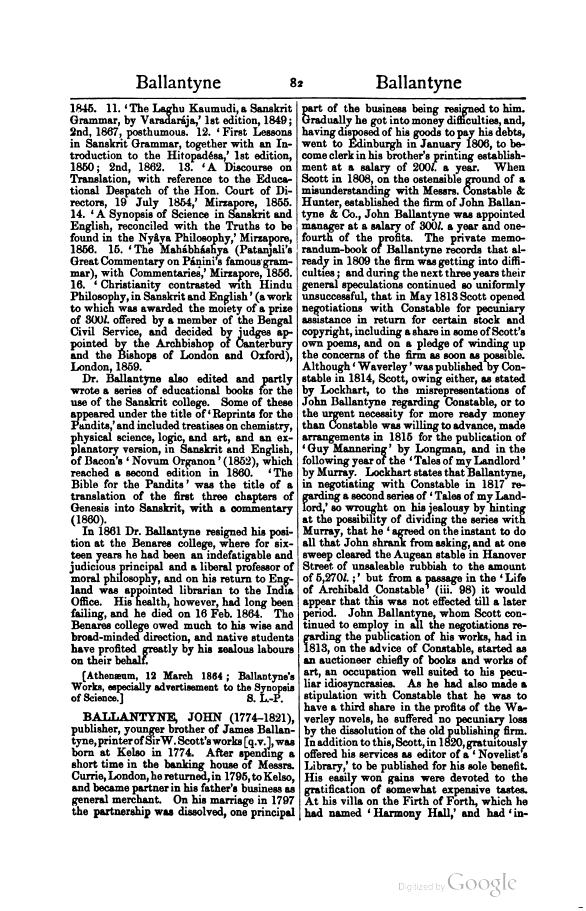-
1845.
- ‘The Laghu Kaumudi, a Sanskrit Grammar, by Varadarája,’ 1st edition, 1849; 2nd, 1867, posthumous.
- ‘First Lessons in Sanskrit Grammar, together with an Introduction to the Hitopadésa,’ 1st edition, 1850; 2nd, 1862.
- ‘A Discourse on Translation, with reference to the Educational Despatch of the Hon. Court of Directors, 19 July 1854,’ Mirzapore, 1855.
- ‘A Synopsis of Science in Sanskrit and English, reconciled with the Truths to be found in the Nyâya Philosophy,’ Mirzapore, 1856.
- ‘The Mahábháshya (Patanjali's Great Commentary on Pánini's famous grammar), with Commentaries,’ Mirzapore, 1856.
- ‘Christianity contrasted with Hindu Philosophy, in Sanskrit and English’ (a work to which was awarded the moiety of a prize of 300l. offered by a member of the Bengal Civil Service, and decided by judges appointed by the Archbishop of Canterbury and the Bishops of London and Oxford), London, 1859.
Dr. Ballantyne also edited and partly wrote a series of educational books for the use of the Sanskrit college. Some of these appeared under the title of ‘Reprints for the Pandits,’ and included treatises on chemistry, physical science, logic, and art, and an explanatory version, in Sanskrit and English, of Bacon's ‘Novum Organon’ (1852), which reached a second edition in 1860. ‘The Bible for the Pandits’ was the title of a translation of the first three chapters of Genesis into Sanskrit, with a commentary (1860).
In 1861 Dr. Ballantyne resigned his position at the Benares college, where for sixteen years he had been an indefatigable and judicious principal and a liberal professor of moral philosophy, and on his return to England was appointed librarian to the India Office. His health, however, had long been failing, and he died on 16 Feb. 1864. The Benares college owed much to his wise and broad-minded direction, and native students have profited greatly by his zealous labours on their behalf.
[Athenæum, 12 March 1864; Ballantyne's Works, especially advertisement to the Synopsis of Science.]
BALLANTYNE, JOHN (1774–1821), publisher, younger brother of James Ballantyne, printer of Sir W. Scott's works [q. v.], was born at Kelso in 1774. After spending a short time in the banking house of Messrs. Currie, London, he returned, in 1795, to Kelso, and became partner in his father's business as general merchant. On his marriage in 1797 the partnership was dissolved, one principal part of the business being resigned to him. Gradually he got into money difficulties, and, having disposed of his goods to pay his debts, went to Edinburgh in January 1806, to become clerk in his brother's printing establishment at a salary of 200l. a year. When Scott in 1808, on the ostensible ground of a misunderstanding with Messrs. Constable & Hunter, established the firm of John Ballantyne & Co., John Ballantyne was appointed manager at a salary of 300l. a year and one-fourth of the profits. The private memorandum-book of Ballantyne records that already in 1809 the firm was getting into difficulties; and during the next three years their general speculations continued so uniformly unsuccessful, that in May 1813 Scott opened negotiations with Constable for pecuniary assistance in return for certain stock and copyright, including a share in some of Scott's own poems, and on a pledge of winding up the concerns of the firm as soon as possible. Although ‘Waverley’ was published by Constable in 1814, Scott, owing either, as stated by Lockhart, to the misrepresentations of John Ballantyne regarding Constable, or to the urgent necessity for more ready money than Constable was willing to advance, made arrangements in 1815 for the publication of ‘Guy Mannering’ by Longman, and in the following year of the ‘Tales of my Landlord’ by Murray. Lockhart states that Ballantyne, in negotiating with Constable in 1817 regarding a second series of ‘Tales of my Landlord,’ so wrought on his jealousy by hinting at the possibility of dividing the series with Murray, that he 'agreed on the instant to do all that John shrank from asking, and at one sweep cleared the Augean stable in Hanover Street of unsaleable rubbish to the amount of 5,270l.;' but from a passage in the ‘Life of Archibald Constable’ (iii. 98) it would appear that this was not effected till a later period. John Ballantyne, whom Scott continued to employ in all the negotiations regarding the publication of his works, had in 1813, on the advice of Constable, started as an auctioneer chiefly of books and works of art, an occupation well suited to his peculiar idiosyncrasies. As he had also made a stipulation with Constable that he was to have a third share in the profits of the Waverley novels, he suffered no pecuniary loss by the dissolution of the old publishing firm. In addition to this, Scott, in 1820, gratuitously offered his services as editor of a ‘Novelist's Library,’ to be published for his sole benefit. His easily won gains were devoted to the gratification of somewhat expensive tastes. At his villa on the Firth of Forth, which he had named ‘Harmony Hall,’ and had 'in-

